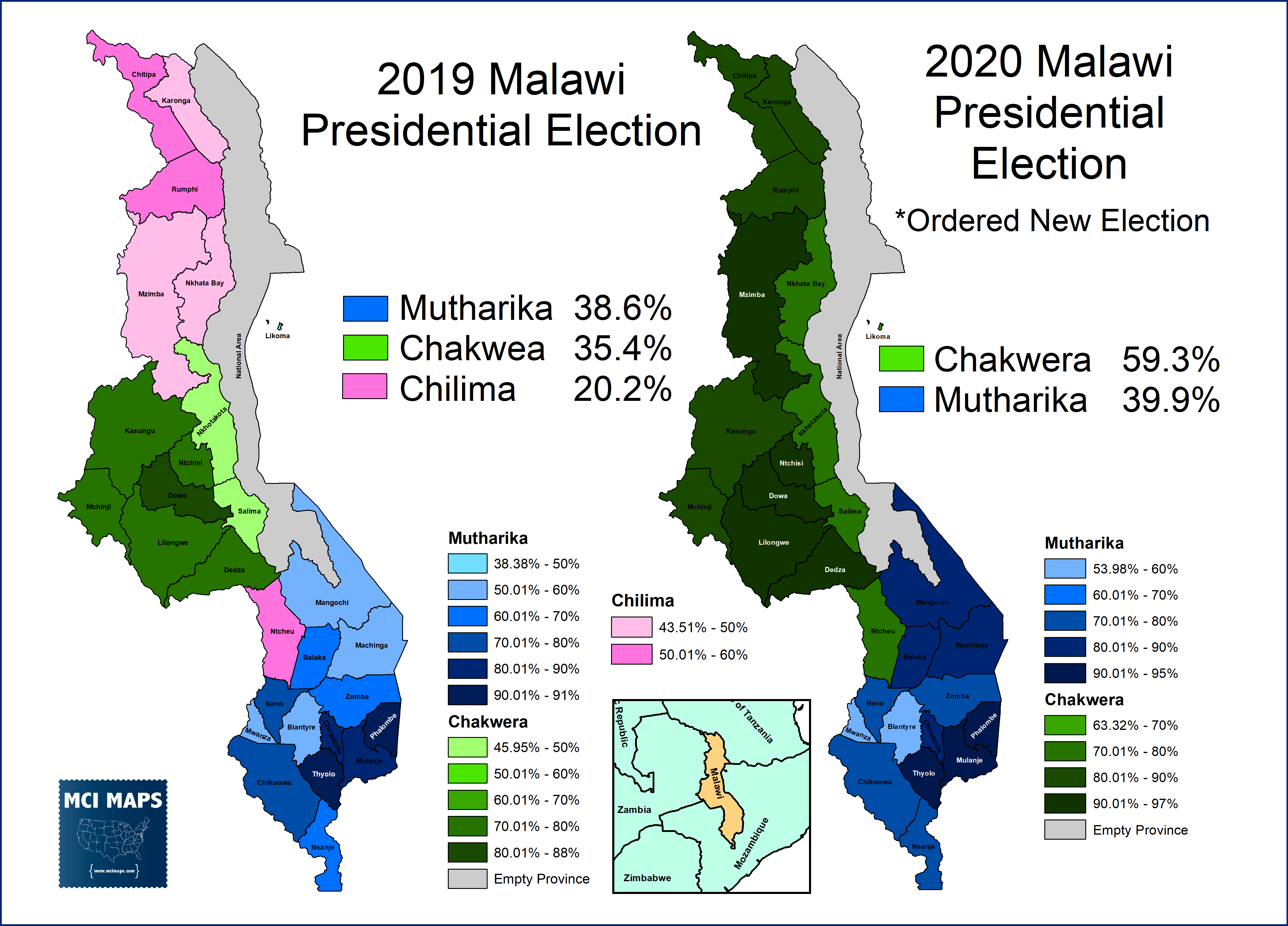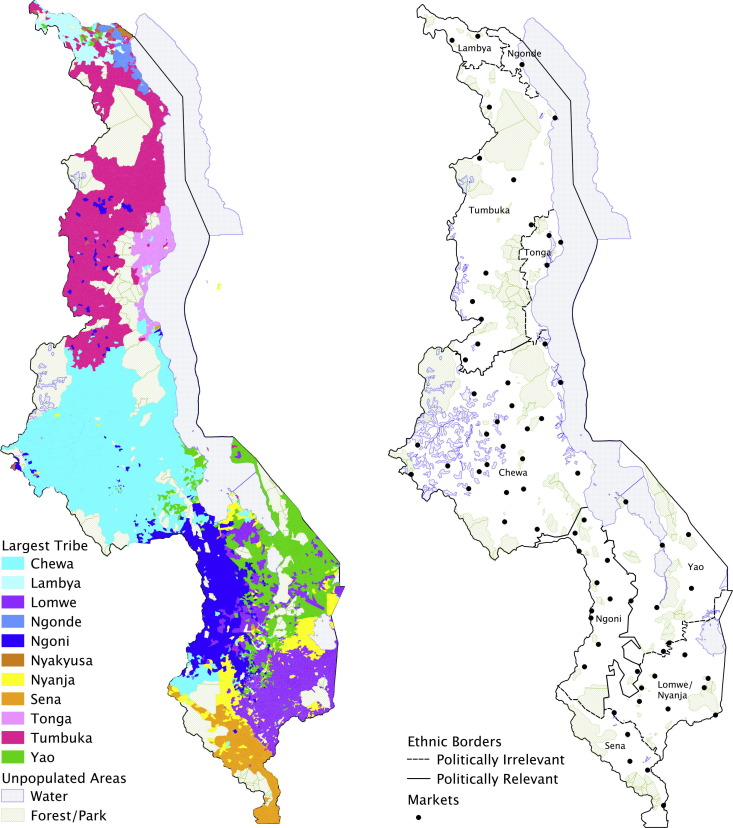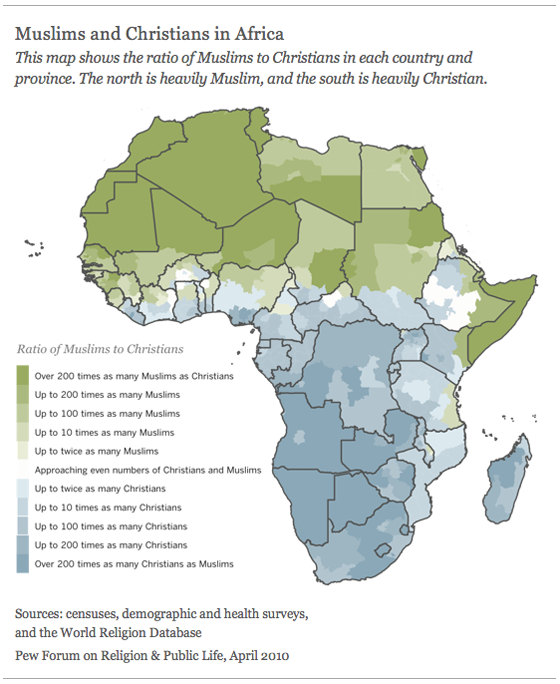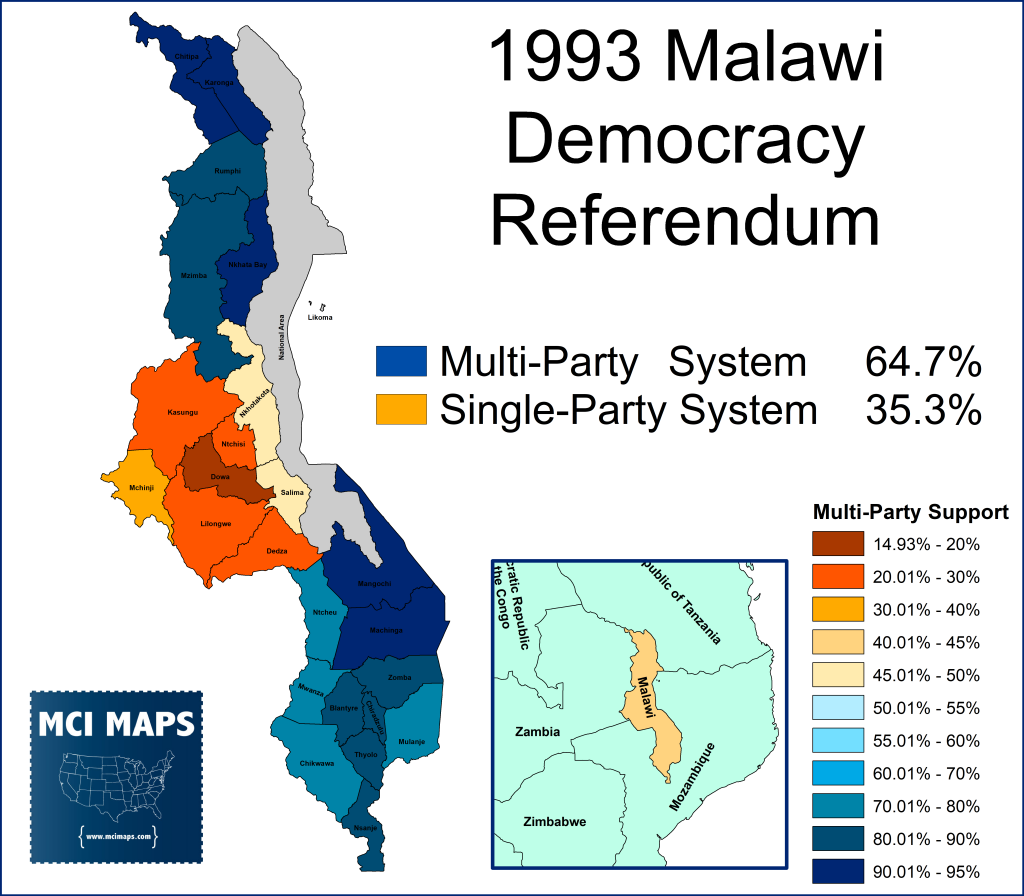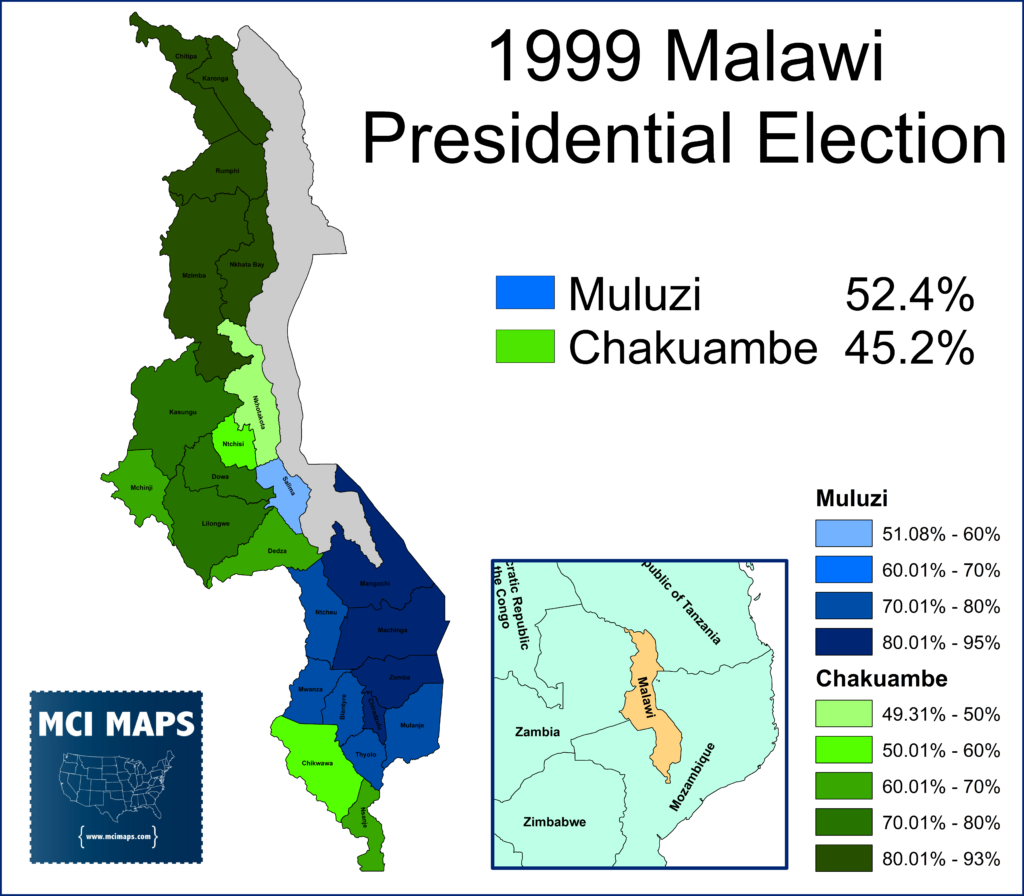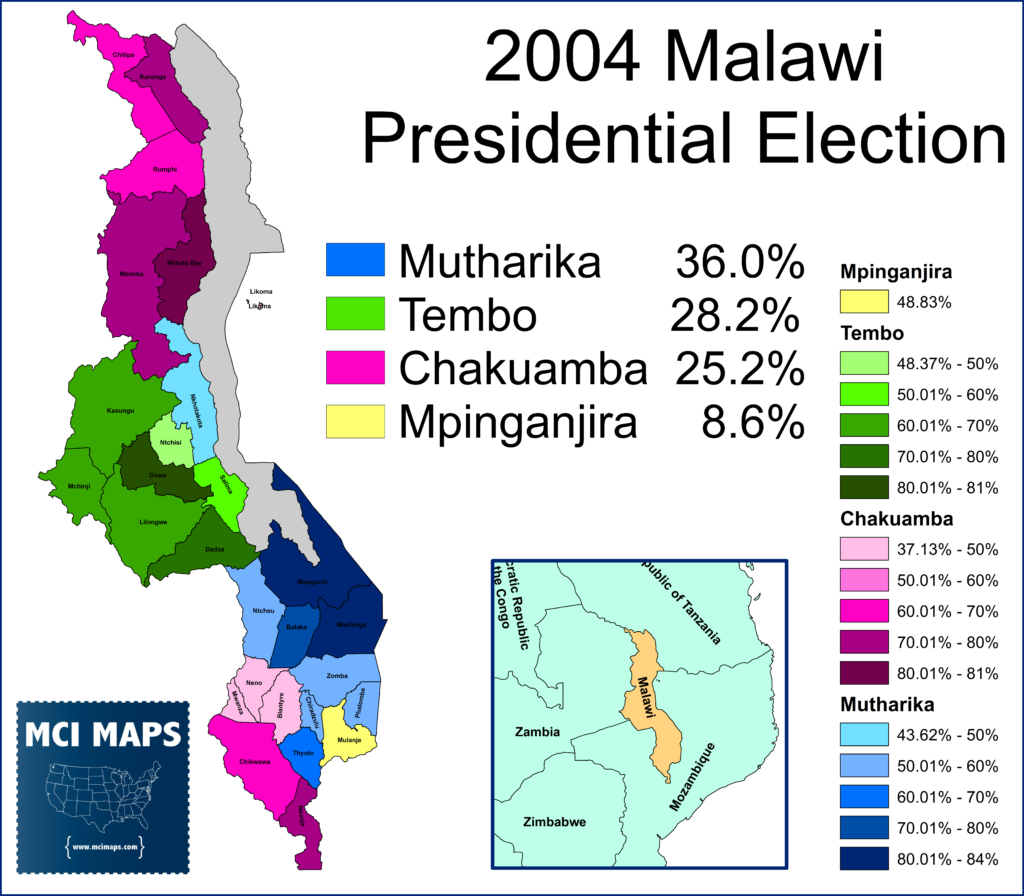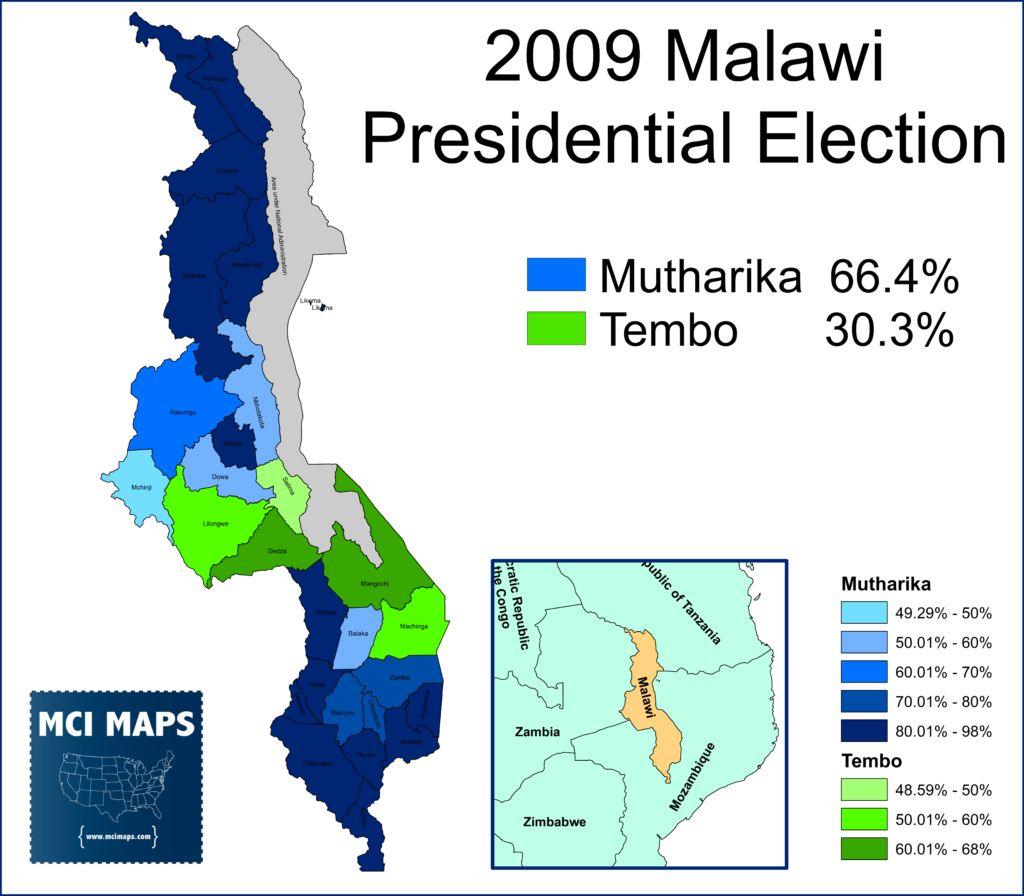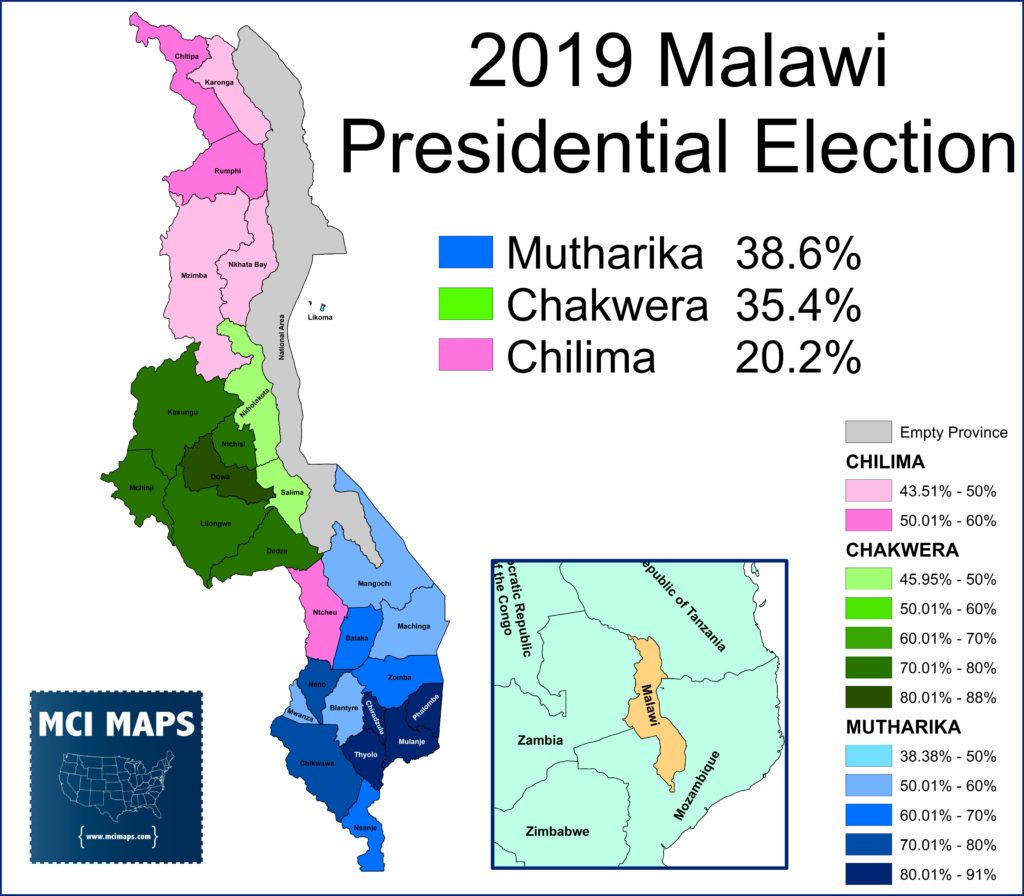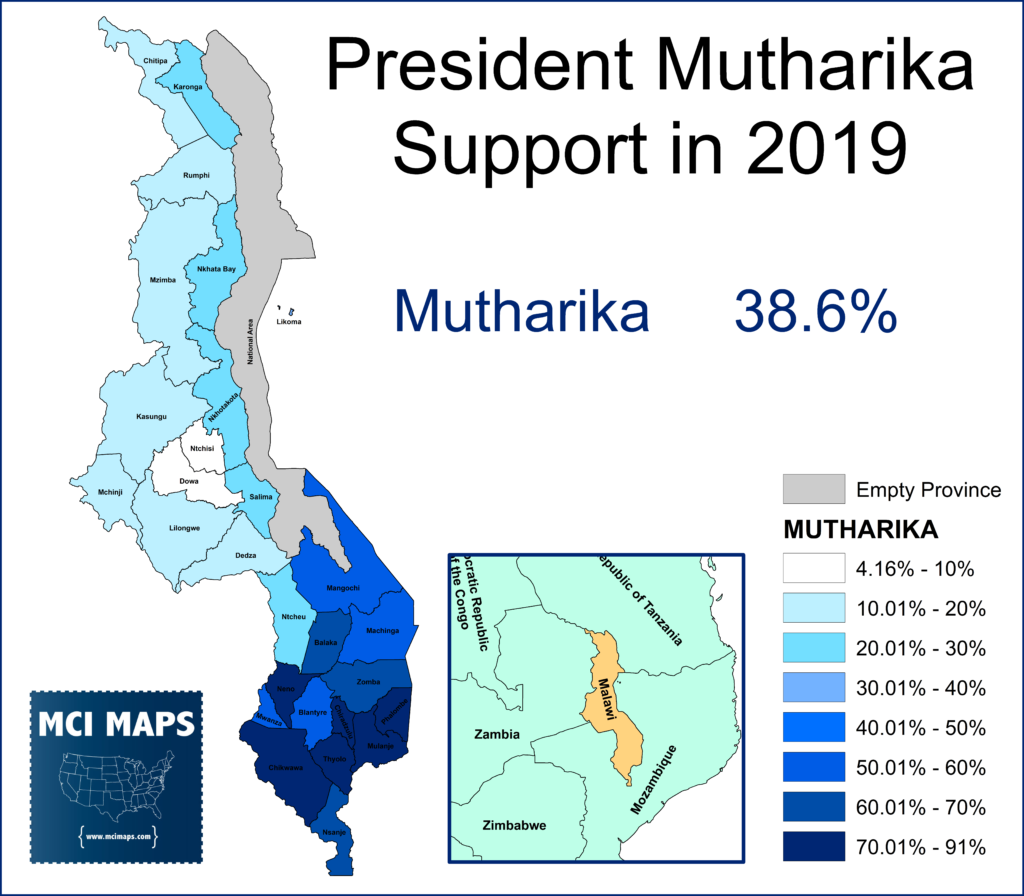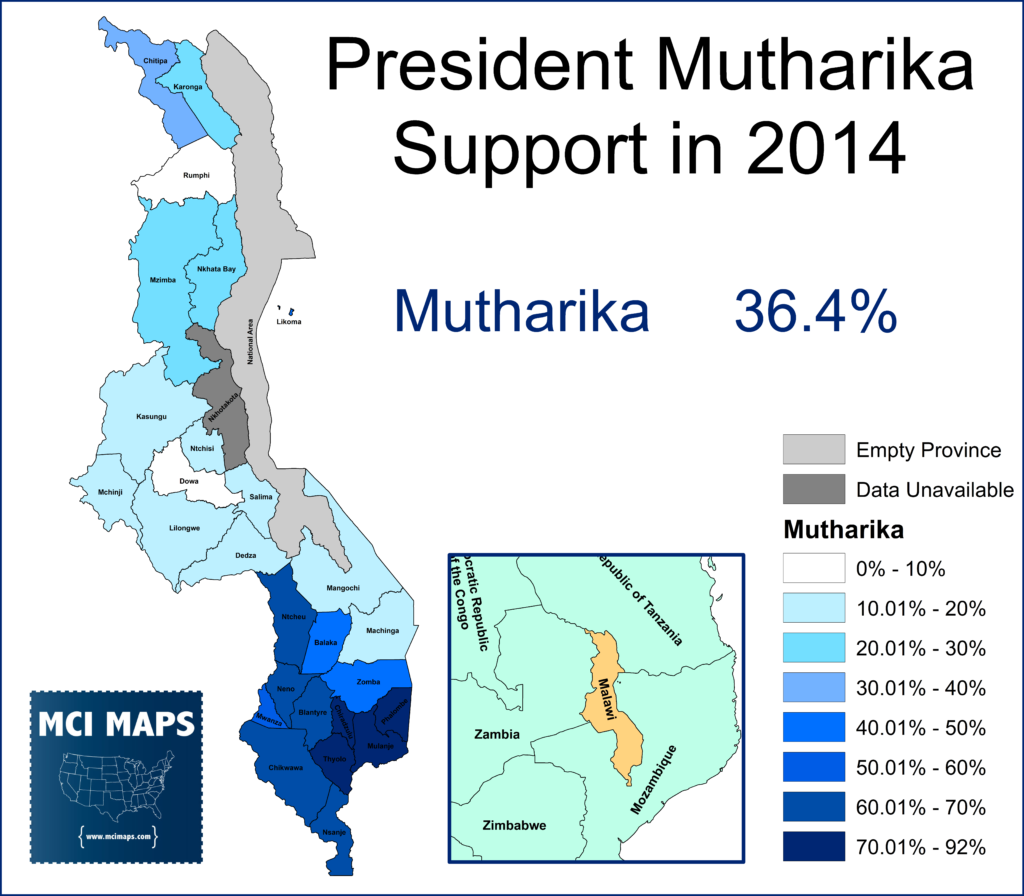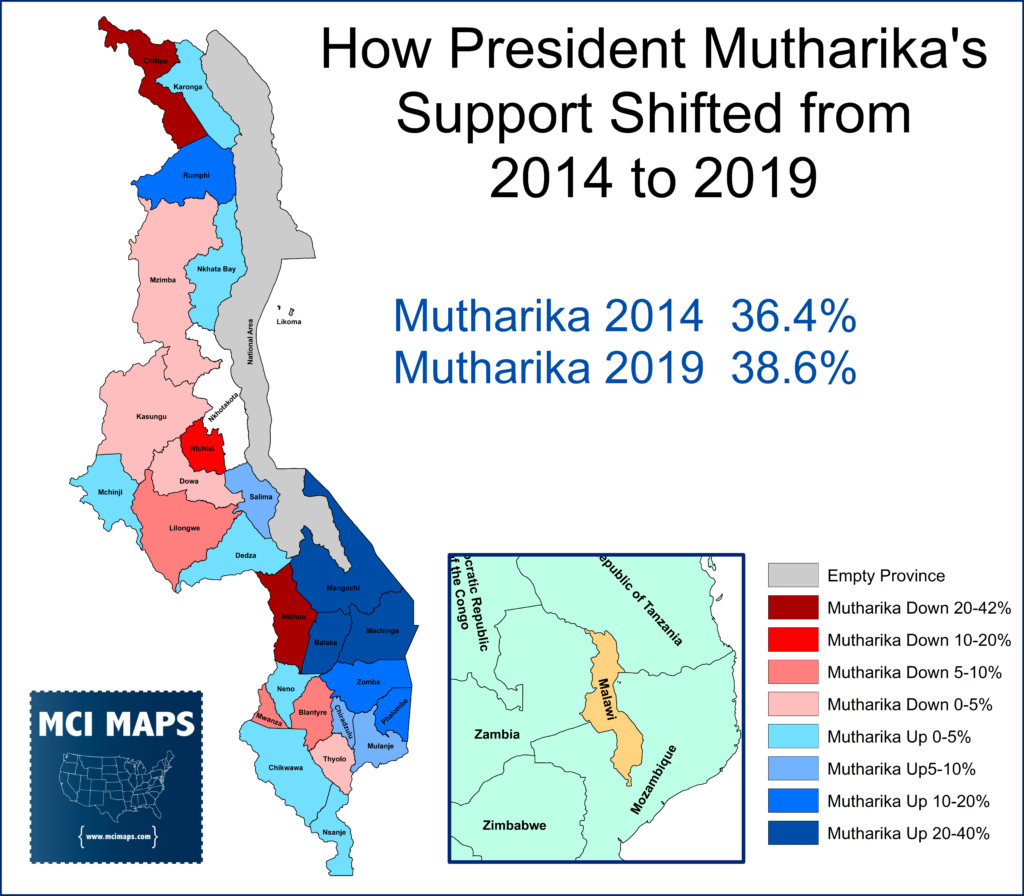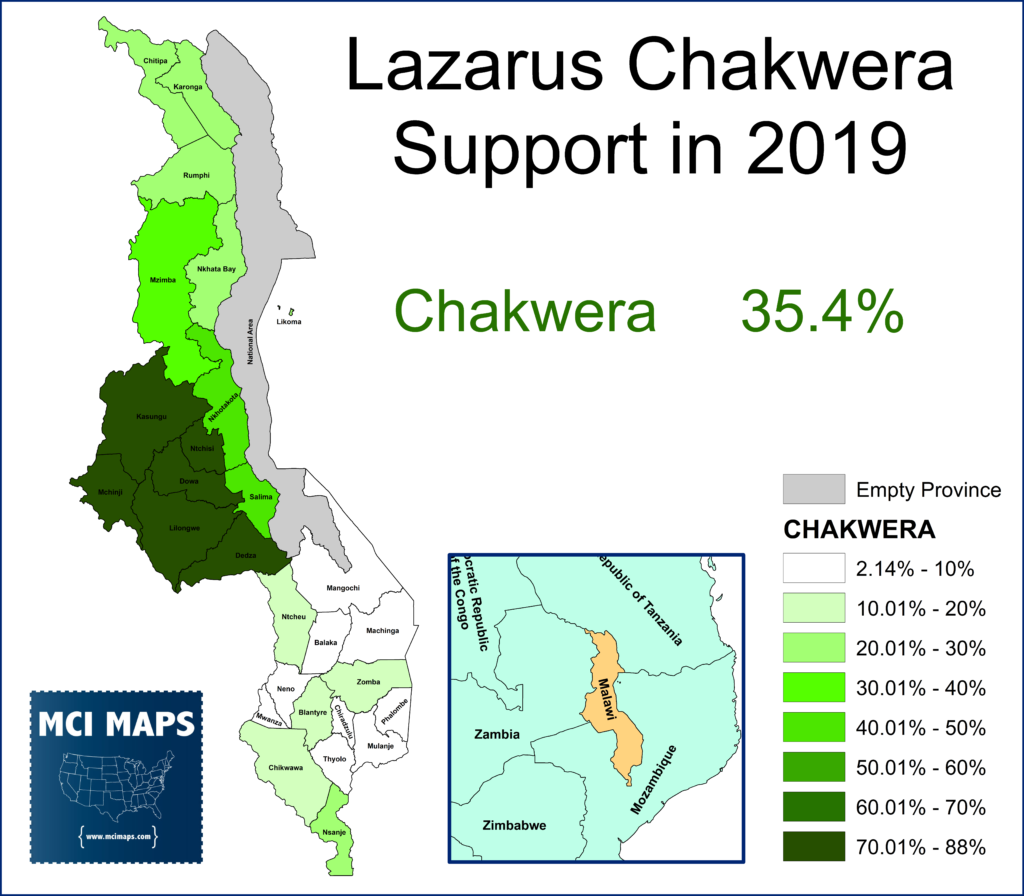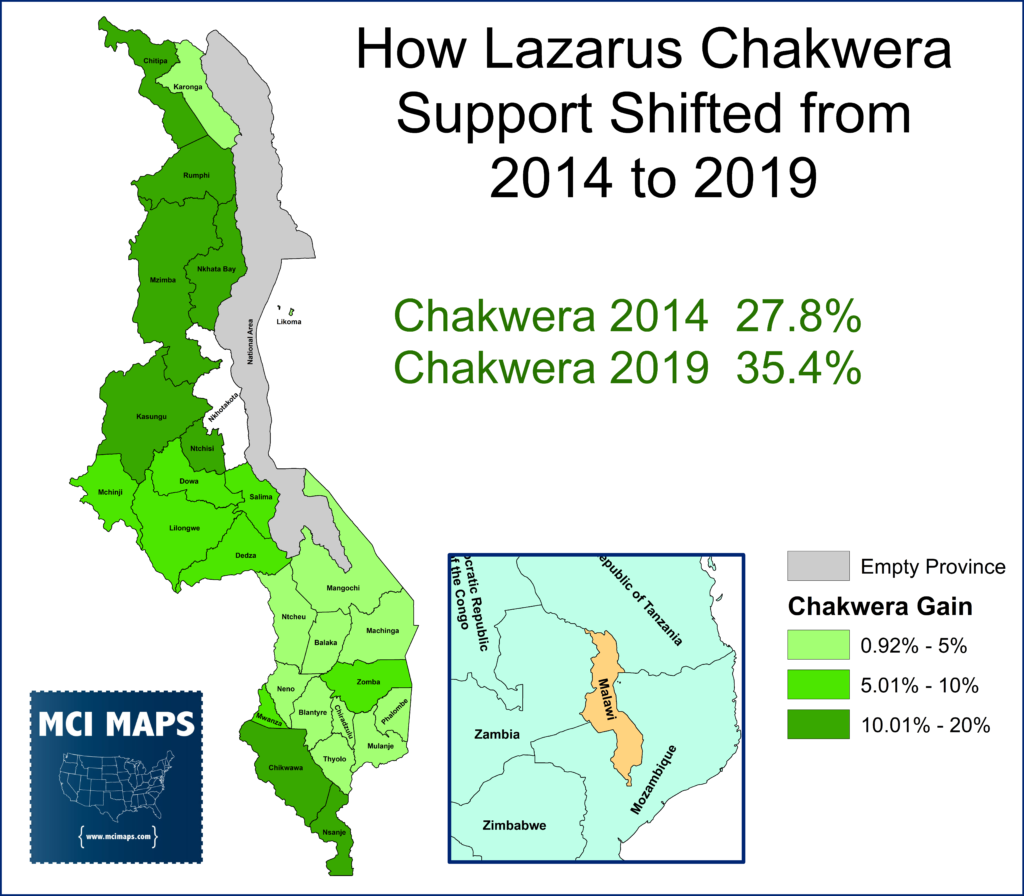(NOTE! This article was originally written in 2019 after Malawi’s Presidential Election. Afterward, the Supreme Court of Malawi ordered a new election following evidence of vote tampering. The end of the article has been updated to include results from the new election and the events from its campaign).
Last month, the small African national of Malawi held its Presidential election. A poor and heavily agriculture-based nation, Malawi is often forgotten by even those who take the time to follow international affairs. Lack of major ethnic conflict, something sadly common in the continent (thanks to the effects of European colonialism) has resulted in Malawi’s lack of notoriety. Since becoming a democracy in the 1990s, the nation has now held six Presidential elections – all regarded as largely fair and seen peaceful transitions of power. That said, these elections often result in winners with under a majority of the vote and see heavy ethnic block-voting.
The latest election saw incumbent Peter Mutharika win with 39% of the vote with support overwhelmingly concentrated in one region of the country. Since the election, the 2nd place candidate, Lazarus Chakwera, has refused to concede after results said he lost by 150,000 votes. International observes view the counting of the vote as fair but questions are arising about a correction fluid (think white out) possibly being found on count forms. It is hard to assess as of this moment what might be true or exaggerated from each side. Lawsuits are currently going through the Malawi courts, which have stood up to the government in the past. In the meantime, protests and clashes have erupted between the government and Chakwera backers.
I decided to use the recent election to not only examine the current situation in Malawi but look at its democratic history as well.
Ethnic Groups of Malawi
Malawi is a small nation but has many different ethnic and language groups. These ethnic groups are often very segregated; clustered in different districts of the country. This map comes from Science Direct.
Ethnic division has existed, but violent conflict has been minimal. The largest Ethnic group is the Chewa, who make up 36% of the population and are heavily clustered in the central portion of the country. The Lomwe are 18% and are heavily concentrated in the south. The third largest group is the Yao, who are largely Muslim and located in the southeast. This group marks the one notable Muslim group, as most of the nation is Christian. A religion map from Pew Research is below.
There are over 10 major ethnic groups in Malawi, each with traditions and political allegiance. Voting is often on ethnic lines, but with less tension. Voters often cast ballots for the party or candidate associated with their tribe; but this is simply seen as supporting your home group, not opposing the others. An analogy could be that the divide is more of a friendly rivalry among tribes vs bitter resentment.
Push for Democracy
Malawi gained its independence in 1964 from Great Britain and quickly became a dictatorship. Hastings Banda had become prime minster while the nation was still a British colony and was elected President in 1966. By 1970 he had been declared President for life and the Malawi Congress Party became the only party in the country. Banda’s rule was authoritarian but did not see major ethnic conflict. The country was considered one of, if not the most, authoritarian and oppressive in Africa; with arrest happening for any offense. While outright conflict and violence didn’t appear on the surface, it is estimates thousands were killed by the government over the decades. Banda was a fierce anti-communist, and this kept him in good standing with Western leaders. Banda’s one credit is that he did not pit ethnic groups against each-other to hold power. He did, however, favor his Chewa ethnic tribe, insisting Chewa be the national language (meaning it would be used in schools and in entertainment – English is the official government language). Banda also upset the Tumbuka people, who heavily populate the North, by removing many schoolteachers (a large share which come from the North) from their positions.
Banda’s rule began to lose its footing in the early 1990s. The end of the cold war meant Western leaders had no use for him anymore and international aid groups began to demand changes as a condition for assistance. A drought and bad government policies led to a food shortage in Malawi; which has historically been poor and underdeveloped. Protests began to emerge in the country as locals felt international groups might back them. Students protested at universities and pastors began to speak up during sermons. Banda’s government even considered murdering Pastors and Priests who spoke up but backed down because the reaction would have been fierce. Banda eventually agreed to a referendum, to be held in 1993, which would determine if the country would become a multi-party state.
The referendum did see plenty of arrests of pro-democracy demonstrators and efforts by the government to suppress the campaign. But the voting did take plus under international observation and was a decisive victory for a multi-party democracy.
The Chewa districts, however, did side with Banda’s one-party rule. Part of this is that Banda had favored his Chewa people in his government. In additional, it is reported intimidation was much stronger in the Chewa strongholds. The other ethnic tribes voted overwhelmingly to become a democracy.
Banda intended to run for the Presidential election to happen the next year. However, he lost to pro-democracy politician Bakili Muluzi; who was part of the Yao tribe. Muluzi dominated with the Yao and Lomwe people, overall doing well in the south – minus the district Banda was originally born in. Banda’s support was largely concentrated in the central portion of the state were his Chewa tribe was.
Muluzi ran under the United Democratic Front Party. Chakufwa Chihana, often called the “Father of Malawi Democracy” came in third by dominating the North; running under the Alliance for Democracy Party.
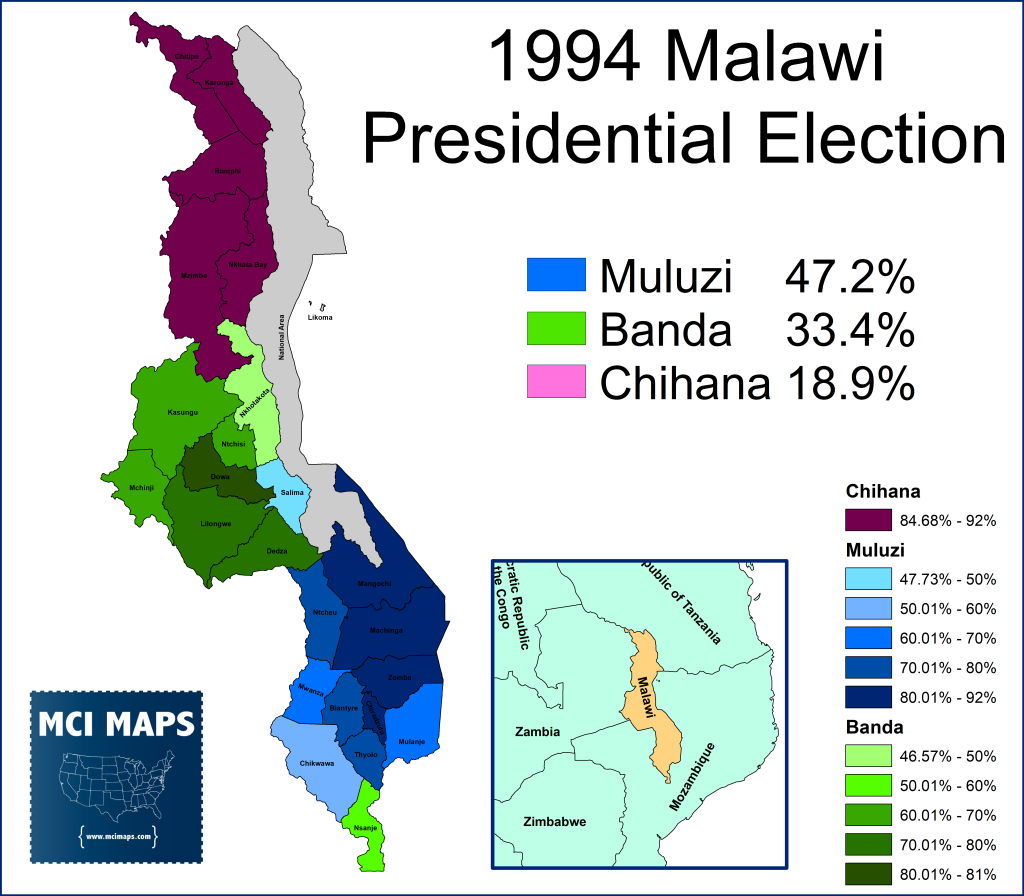
The results were a major victory for democracy. Both Muluzi and Chihana had been in exile during Banda’s dictatorship due to their pro-democracy stances. However, the results did reveal a very strong ethnic and regional divide.
Democracy in Malawi
The Presidential elections since independence have often been heavily contested, but the coalition that elected Muluzi, or some variation of it, has consistently won, while the MCP has consistently come in 2nd place.
In the 1999 elections, Muluzi won re-election with 52% of the vote. His main opposition was Gwanda Chakuamba, who was Banda’s running-mate in 1994. Chakuamba’s running mate was Chihana; part of a coalition between the MCP and the Alliance. They collectively took 45%.
The coalition overwhelmingly took the north and central districts, as well as the southernmost districts (thanks to Chakuamba hailing from there). However, Muluzi racked up huge wins in the southeast – dominating with his fellow Yao voters as well as the Lomwe and Ngoni tribes. The combination of huge shares of the vote in the southeast, as well as the large population in that region, allowed Muluzi to win re-election despite winning fewer districts. (Land doesn’t vote).
In 2004, Muluzi was termed out from office. Muluzi originally tried to circumvent term limits, but the Malawi courts ruled against him. His preferred successor was Bingu Metharika, from the Lomwe tribe. He was a co-founder of the UDF. Meanwhile, the coalition between the Alliance and MCP collapsed (as did the Alliance party itself). The MCP nominated John Tembo, a longtime ally of Banda’s during the dictatorship. Chakuamba, meanwhile, ran again – this time under a party called the Mgwirizano Coalition. Another candidate, Brown Mpinganjira, who had broken from Muluzi over term limits, also ran under the National Democratic Alliance Party.
Mutharika managed a narrow win, winning districts with heavy Lomwe and Yao presence. Despite not being a Yao, his support from Muluzi ensured he dominated its districts. Mpinganjira ate into Mutharika’s Lomwe support. Tembo easily won in the traditional Central/Chewa strongholds, while Chakuamba won the North and far-south, just like he had in 1999.
During Mutharika’s first term, a split between him and Muluzi took place. Muluzi continued to run the UDF Party, so Mutharika formed a new party – the Democratic Progressive Party. He ran for re-election in 2009 under this banner. Muluzi intended to run under the UDF for a third, non-consecutive term. However, the courts and electoral commission ruled he could not. The MCP ran John Tembo again. The chaos around Muluzi’s run (which was tied up in the courts through much of the campaign) and strong economic growth during the last few years led to a landslide re-election for Mutharika.
Mutharika only lost in some of the Chewa districts AND in the Yao districts. Muluzi, once officially off the ballot, encouraged his supporters to back Tembo. Mutharika, meanwhile, dominated with not only his Lomwe tribe but in most of the major ethnic tribes.
2014 Election to Present
During his second term in office, Bingu Mutharika passed away from a heart attack. His running mate, Joyce Banda, became President as a result. A note, Joyce Banda has no relation to the former dictator. The situation was very tense; as Joyce and Bingu had a falling out before his death, and she had been expelled from the DPP. The split arose from the fact Mutharika and the DPP were backing Peter Mutharika, the President’s brother, to be the party nominee in 2014. The party and administration even tried to remove her as Vice President of the country, but the courts sided with her.
When she became President, the cabinet tried to get a court order to block her ascension. Banda made sure the commander of the Malawi army was on her side, and he even stationed troops around her house to protect her. The courts asserted her right to the Presidency and the situation began to cool. After the initial tension, the transition and inauguration with smoothly – drawing international praise.
Banda would seek her own term as President in the 2014 election. She ran under a new party, the People’s Party, but only secured 20%. Peter Mutharika and the DPP secured 36%, while the MCP secured 28%. The UDF also re-emerged, running former President Makili Muluzi’s son, Atupele, for the office.
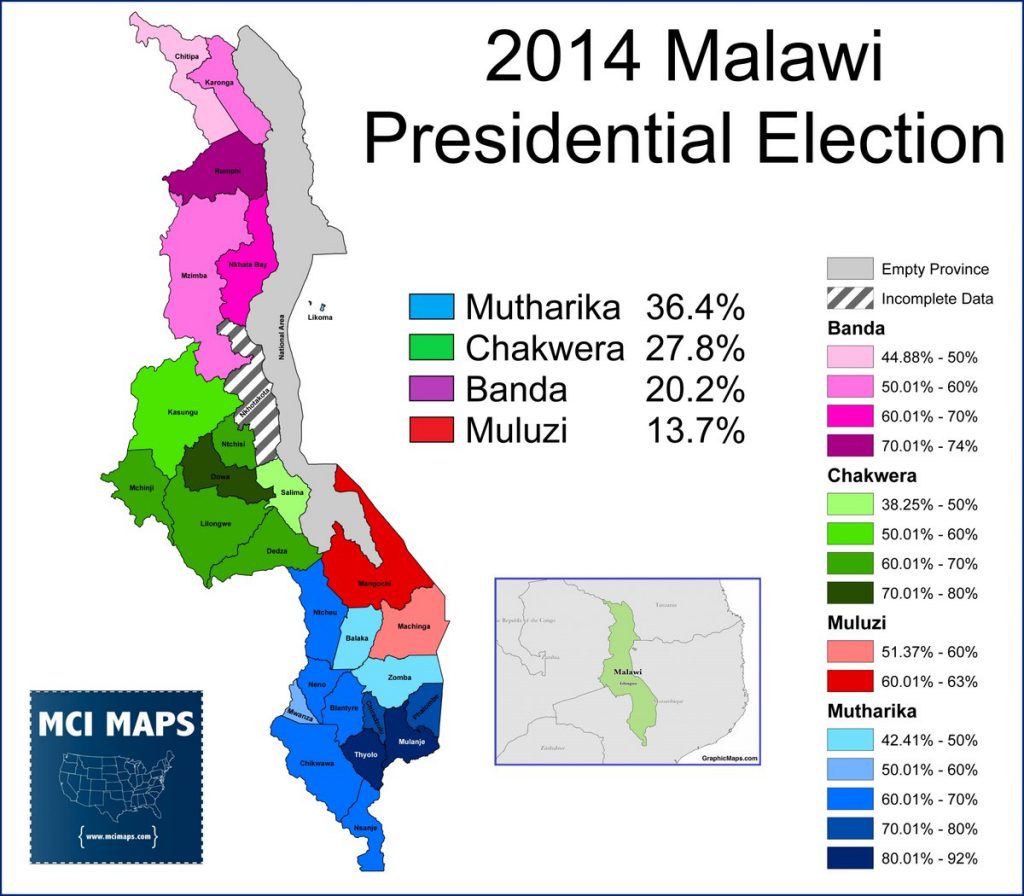
The results were, like many electons, regionally divided. Mutharika won the southern districts, winning Lomwe, Ngoni and Nyakyusa provinces, but Muluzi took the Yao districts. The MCP, running Lazarus Chakwera, a preacher who only got into politics a few years before, did well in their Chewa strongholds, but little elsewhere. Banda, meanwhile, despite being from the south, was strongest in the northern districts; the one area without strong regional or tribal ties to anyone else.
2019 Election
This brings us to the 2019 election – which was a rematch between Mutharika and Chakwera. Banda opted not to run two months before voting, but she endorsed Chakwera. Meanwhile, Mutharika’s 2014 running mate, the incumbent Vice President Saulos Chilima, opted to run under the “United Transportation Movement.” Despite these challenges, Murtharika managed a narrow re-election with 39% of the vote. Chakwere was right behind him with 35%. Muluzi also ran again but did not garner the same support he did the first time, only getting 5% of the vote and winning no districts. The UDF essentially collapsed as the DPP asserted its legacy of support with Lomwe, Yao, and other southern/eastern tribes.
Chawkwera dominated in the Chewa-heavy central districts, but Mutharika racked up large margin in the southern and eastern areas. Chilima, meanwhile, got 20%, taking districts in the north.
Mutharika was strong in the south and very weak outside it. His support is very regionally based.
Mutharika had a similar base of support in 2014, minus the support in the Yao-heavy eastern districts.
Mutharika’s share of the vote only nudged up a bit, but how it shifted from 2014 varied by region. He drastically improved with the Yao people. Muluzi took those votes from him in 2014, but the terrible showing for the UDF this time allowed the President to consolidate that support.
Chawkera got few votes in the southern portion of the state; with his vote being heavily concentrated in the Chewa region.
Chawekera jumped 8 points from 2014 and racked up his biggest gains in the northern districts. He also made gains in the southern-most portion of the country, which is where is running-mate was from.
Mutharika managed to hold on, but did so on a very fractured vote.
Future
Malawi has had a better transition to democracy that others. Corruption and poverty have been issues, but despite ethnic divisions, heavy violence has been rare. The southern-based coalition that was originally the UDF and now the DPP has won every election since democracy; sometimes close and sometimes easily.
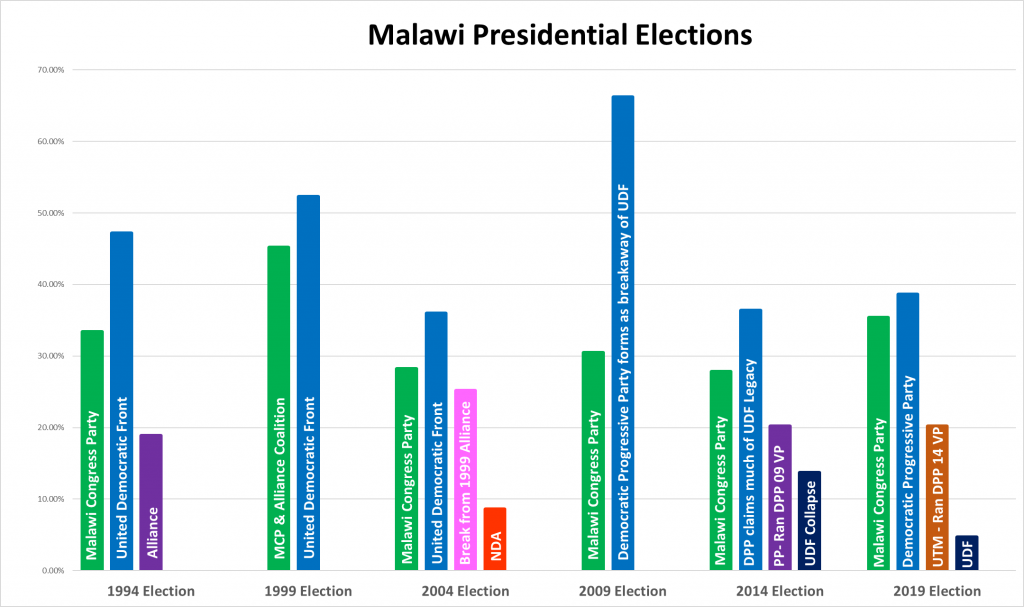
This was the closest Presidential election in Malawi’s history. The trend of strong ethnic-based voting continues. Malawi’s lack of runoff voting means candidates will likely continue to win with under 50%. The dominance of the southern voting block in elections is partially aided by the lack of runoffs and frequency of many serious candidates. As protests rage over the recent election, one issue rising as a talking point from the protesters is the fact Mutharika’s base is so regionally concentrated. The western and northern provinces feel left out of governing. Whatever the results of the lawsuits over this election, Malawi’s government must determine if electoral reform is needed to force broader coalitions; which may help stem what feels like a growing regional resentment.
(Update) New Election Ordered
After an investigating into the vote count irregularities found in the 2019 election, the Malawi Supreme Court ordered a new vote to be held. The election is scheduled for June 23rd and a new head of the election commission is in place. The vote is also to be held under new rules that will set up a runoff system if no one gets 50% (something sorely needed). Check back for updates after the new vote takes place.
2020 NEW Election
After Malawi’s court ordered a new election, President Mutharika appealed to stop the decision. His appeals, however, failed. The COVID-19 outbreak did delay the polls, but June 23rd was formally announced as the new day of the vote. The election saw a dramatic development when Saulos Chilima, who has been Mutharika’s Vice President until 2019 and then run as a third candidate; decided to join Lazarus Chakwera’s MCP ticket as running mate. This meant the MCP ticket would include candidates who won the central and northern communities in the 2019 vote. Mutharika, meanwhile, switched his DPP running mate to Atupele Muluzi, the son of the first democratically elected President and a candidate in 2019.
Both replacements on the VP slate gave Mutharika and Chakwera additional geographic bases.
- Chilima would give the MCP inroads into the more ethnically diverse north
- Mulizi would give the DPP inroads into the Yao-heavy districts of the upper-south that he had done best in.
Heading into the election, polls showed a vast majority of voters felt the country was heading in the wrong direction. The polls showed Mutharika down double digits.
When the results began to come in once polls were closed, they began to show what would be a landslide election for the MCP and the Chakwera/Chilima ticket.
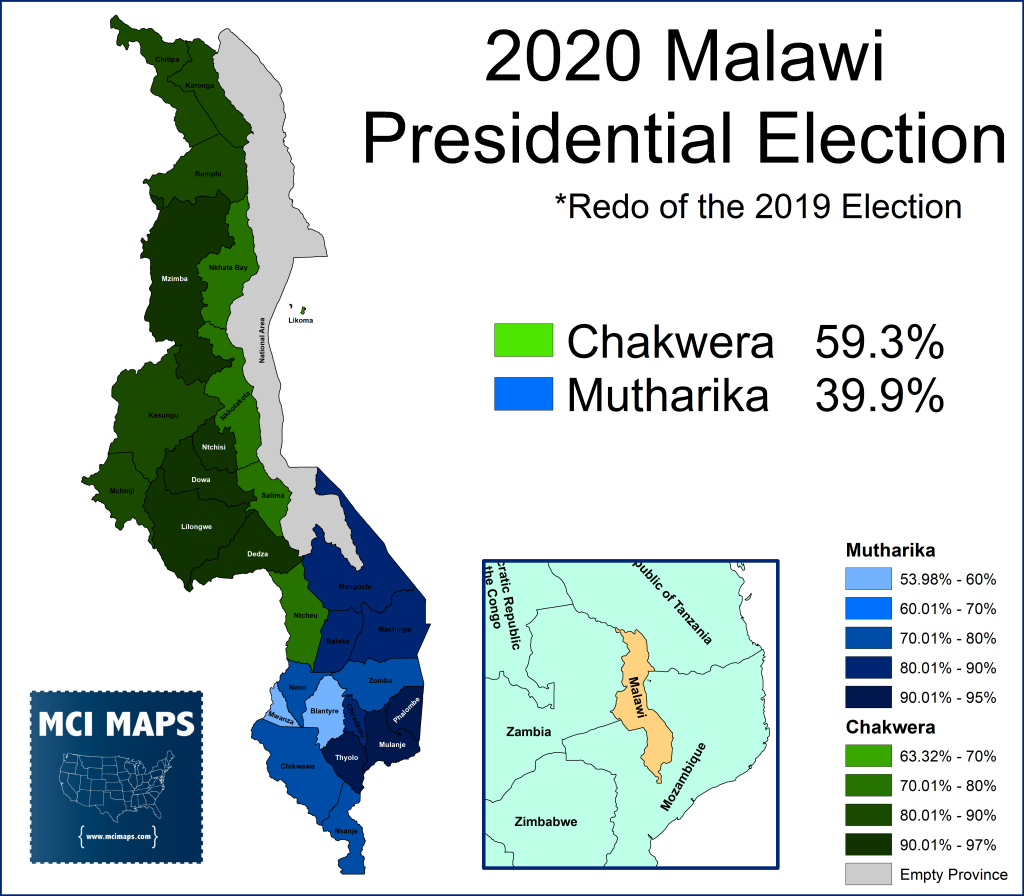
The MCP ticket dominated in the central regions of the state and, unlike 2019, dominated the north as well. The southern communities, meanwhile, stuck with the DPP.
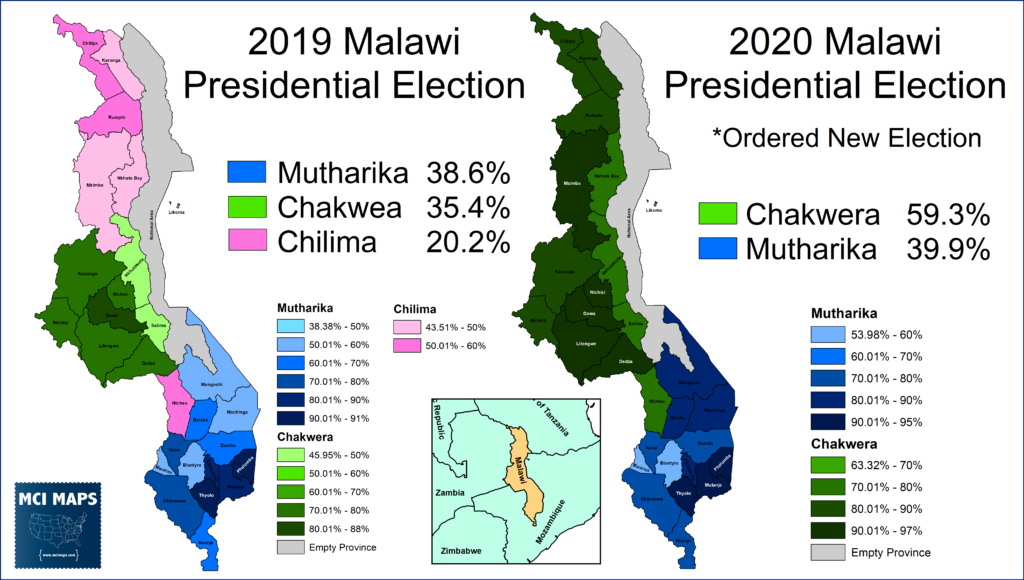
The addition of Chilima to the MCP ticket clearly had an effect in the north.
Mutharika actually got a slightly higher percent than in 2019, but he saw Chakwera race past him. Mutharika did better in most of the south, especially the Yao-heavy regions where Mulizi did best, but he did lose narrow ground in the central and northern communities.
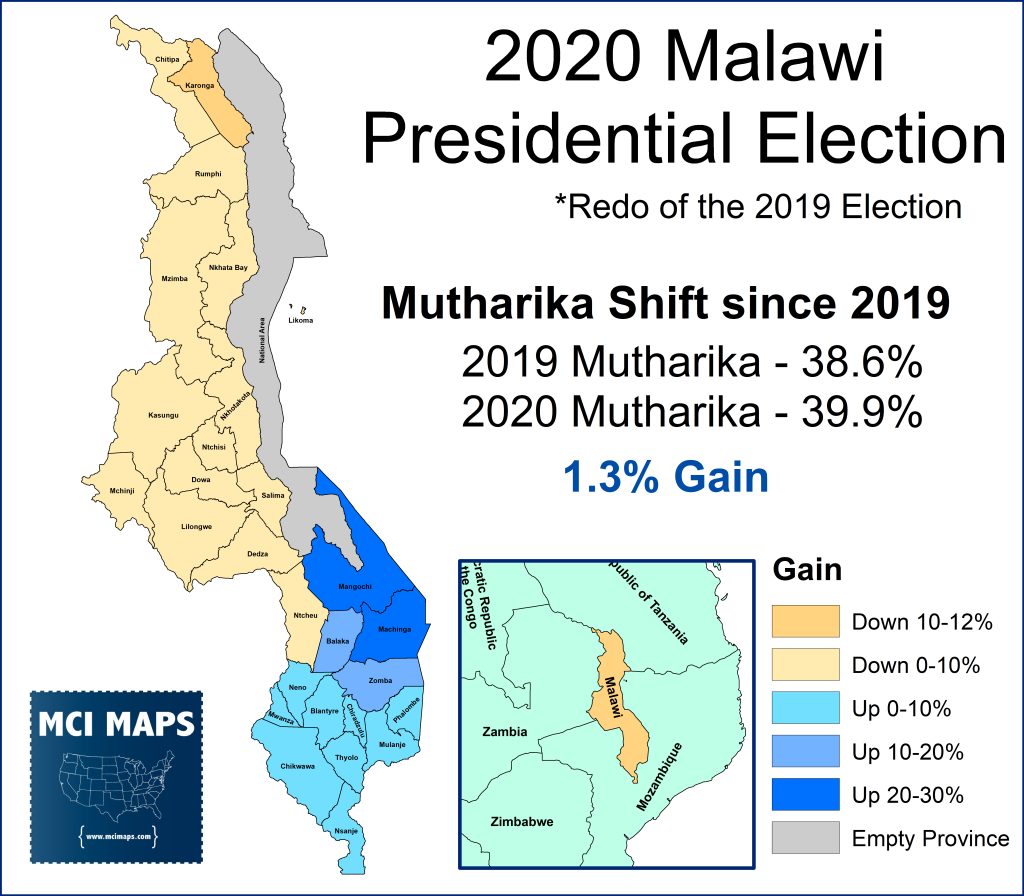
Chakwera, meanwhile, did better in every province in the state. Of course his biggest gains came in the areas where Chilima had won in 2019.
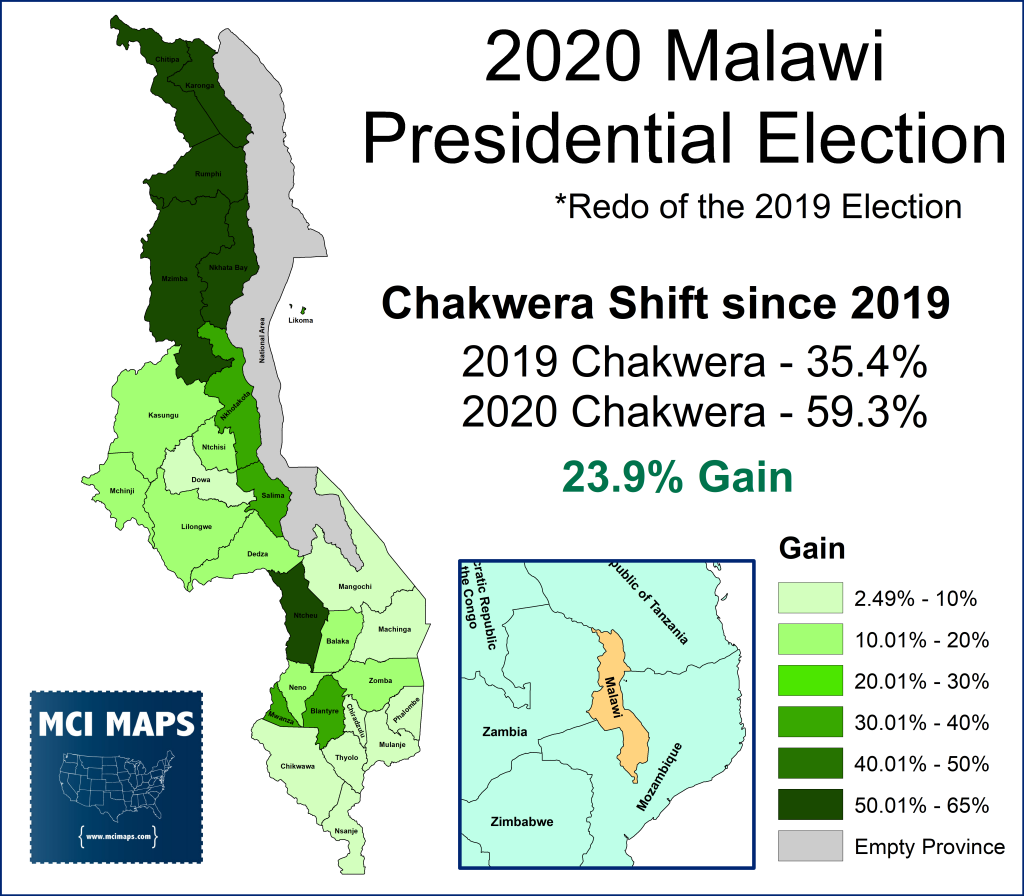
Overall, both candidates gained ground, but Chakwera had a net gain of just under 23%. He has huge increases in the north and more modest ones in the south and central area. The only big areas where Mutharika had a net gain was in the areas he was boosted by Muluzi.
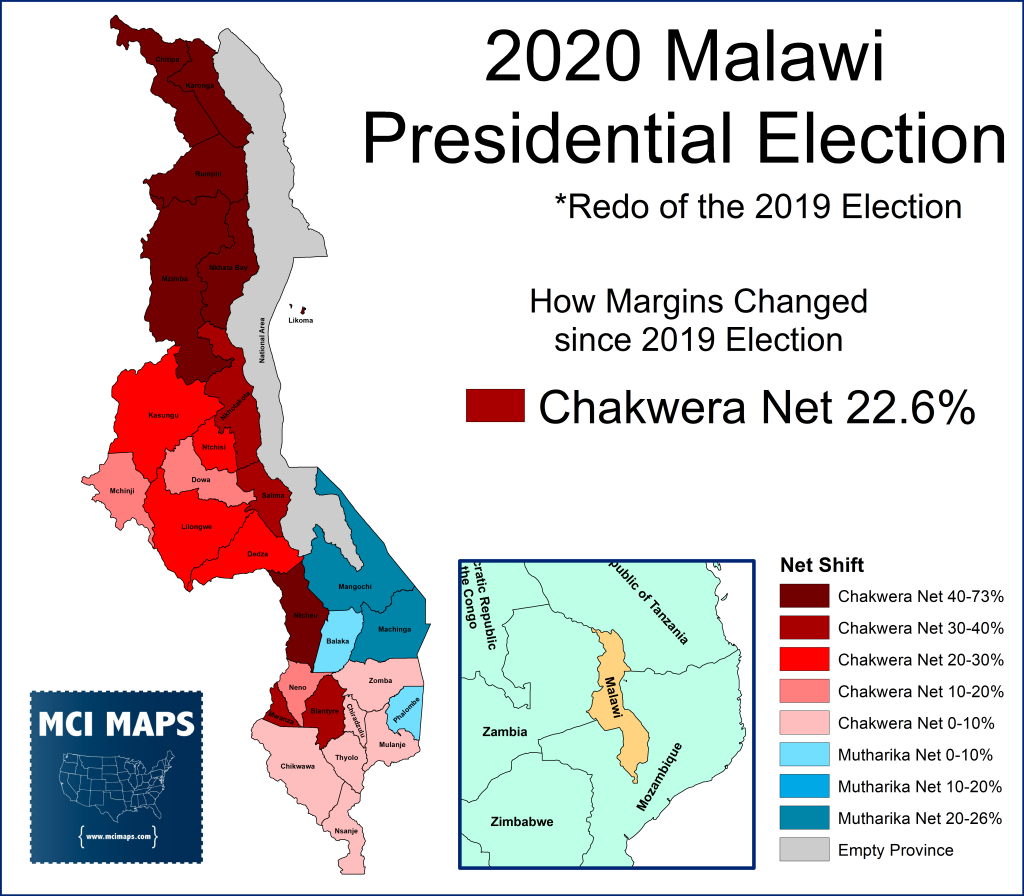
These results represent a major sea change in Malawi. The is the first time a coalition not based out of the south has won the Malawi Presidency. It is the second biggest win since the 2009 election.
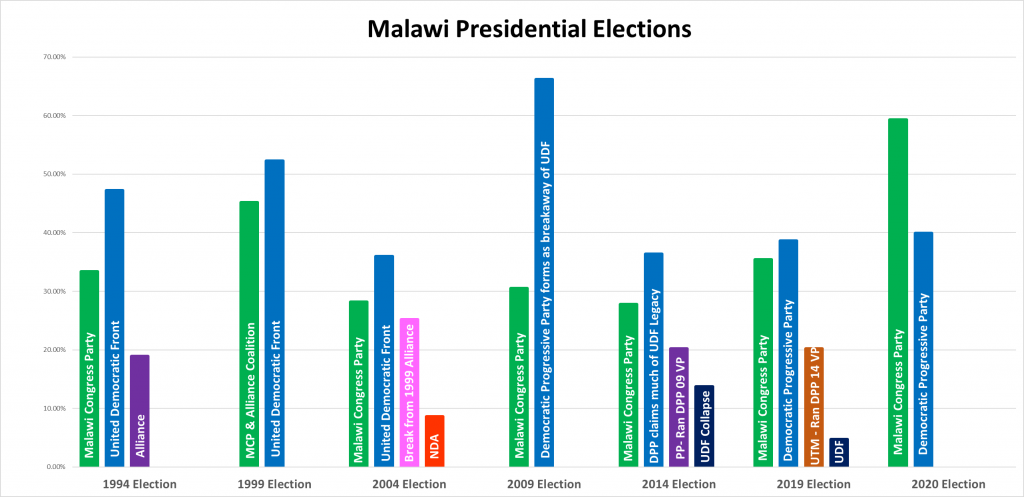
The election is also a major statement for Democracy in Africa. Despite some grumblings and accusations from Mutharika, Chakwera has already been sworn in as President and there has been little or no violence in the transition. Mutharika’s attempts at last minute power grabs and court stacking were also summarily shot down.
Malawi has again demonstrated its ability to weather storms and come out as a Democracy. Sadly too often small success stories like this don’t get the wall-to-wall coverage that ethnic violence does. It is is important, however, to stake stock of Malawi’s young democracy.

